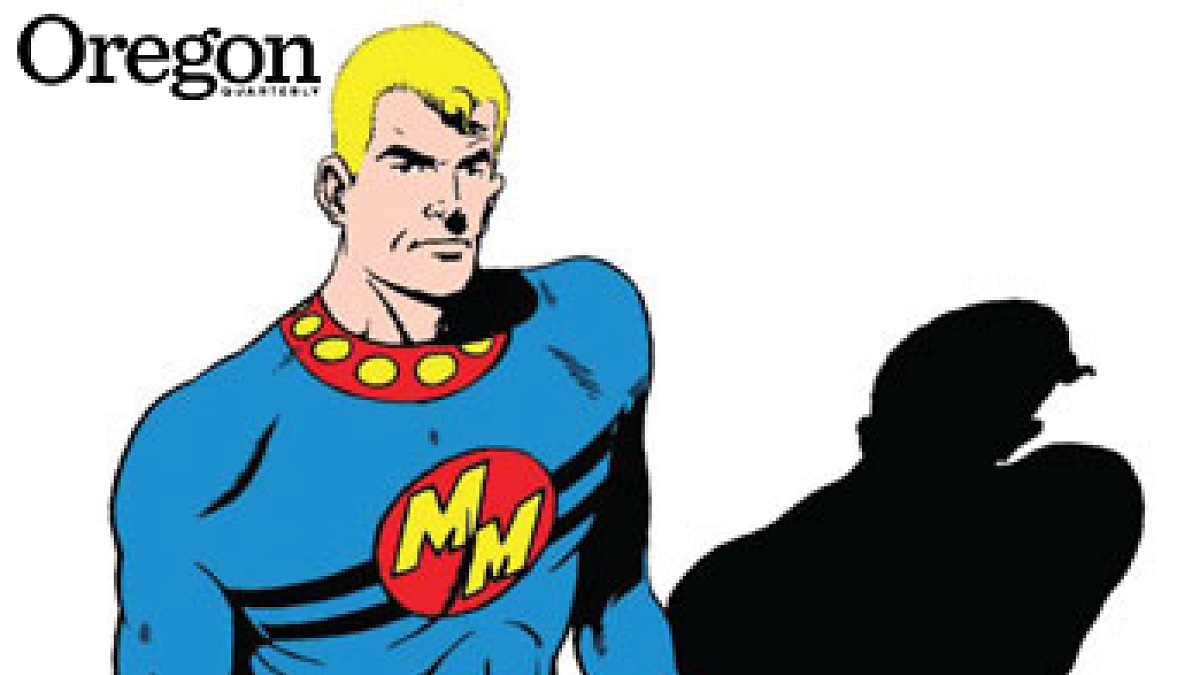Comic book heroes use their super powers to fly over buildings and save the world from imminent doom, but when it comes to the challenges of love and marriage they can be as flummoxed as the rest of us mere mortals. This idea is explored in the excerpt below from Do the Gods Wear Capes? (Continuum, 2011) by English professor Ben Saunders. Saunders is the program director for the UO's new minor in comics and cartoon studies.
What would it feel like to be a superhero in love?
In the 1980s, Alan Moore and Alan Davis considered this question in their groundbreaking reinterpretation of an obscure British hero named Marvelman—a character who had briefly flourished in the 1950s, as a shameless rip-off of the more famous American superhero, Captain Marvel. (In the U.S. original, an ancient wizard grants young newsboy Billy Batson the ability to transform into a mighty superbeing on speaking the magic word, "Shazam!" In the British version, a mysterious astrophysicist grants young reporter Micky Moran the ability to transform into a mighty superbeing on speaking the magic word, "Kimota!"—that is, "atomic," spelled phonetically and backwards.) Like Captain Marvel, Marvelman possesses the standard superheroic gifts: great strength, apparent invulnerability, tremendous speed, and of course, the power of flight. But in Moore and Davis's revision, the gulf between the human and the superhuman was emblematized less by Marvelman's extraordinary physical abilities than by his capacity to love.
Consider, for example, this domestic scene. Mike Moran, no longer quite so young, talks with his wife Liz at the breakfast table. He complains that he feels alienated before his own super-heroic alter ego. "He's just so much better than I am," Moran admits. "At everything. His thoughts are like poetry or something. And . . . his emotions are so pure. When he loves you, it's gigantic. His love is so strong and direct and clean . . . When I love you it's all tangled up with who's not doing their share of the washing up, and twisted, neurotic little things like that."
It's a short speech, but it combines profound aspiration with an acknowledgement of failure and a measure of self-conscious bathos—indicating among other things that the emotional dynamics of the superhero genre can be more nuanced than some critics acknowledge. It's also a confession of inadequacy that invites us to identify not with the icon of perfected masculinity who stands as the eponymous hero of the story, but with an altogether ordinary man. This man does not care much about bending steel with his bare hands or beating up bank robbers. He just wants to love his wife in a way that doesn't feel compromised by the banal character defects of his all-too-human nature—his acts of petty scorekeeping, his garden-variety narcissism. But, of course, he cannot always love her in that transcendent way, and the superhuman abilities of his heroic alter ego only exacerbate the point by exposing the painful limitations of his everyday incarnation. The irony is poignant, a reminder that even at our best we are rarely as good as we might wish to be. Little things like household chores get in the way of our finest feelings. Striving to grow spiritually, we get stuck on superficial trivialities that diminish our capacity for love.
At this moment, the superhero fantasy has become a self-reflexive allegory about the frustrations of human desire, with some obvious spiritual overtones. For it turns out that what Mike Moran really wants is to want his wife the way he does when he is Marvelman—which means what he really desires is a particular experience of desire itself. He wants to feel a love that is "like poetry," unsullied by either his own human imperfections or those of his no less human partner. He wants to feel a love that is gigantic, strong, pure, and that forgives all trespasses, great and small. In short, he wants to inhabit a structure of feeling that could best be described as divine. Indeed, this passing resemblance to the divine etiology of desire that St. Augustine famously traced, many centuries ago, when he argued that all sensations of early concupiscence were more or less distorted reflections of the soul's original and primary desire for God. Of course, the context is modern and secular, Moran's language is psychological rather than theological, and his choice of devotional object, in orthodox terms, is uxorious. But like Augustine, Mike Moran's awareness of the profound inadequacy of human love is grounded in his sense that more-than-human love is better.
For Alan Moore in Marvelman, then, to imagine loving like a superhero is to imagine loving like God—at least, according to several religious traditions. It is to imagine what it would be like to feel an infinite, compassionate, and forgiving love for even the lowliest and least deserving of creatures. But the actual effect of postulating this super-heroic variant on the experience of divine love turns out to be to focus our attention on the nature of human love and its limitations. This moment in Marvelman thus encapsulates . . . the idea that our fantasies of superhuman perfection can not only provide insight into our projections of the infinite, but also sharpen our conceptions of what it means to feel love, as finite and mortal beings, for others who are no less finite and mortal.
Comic Relief

Charles M. Schulz entertained readers for 50 years with almost 18,000 comic strips featuring Charlie Brown, Lucy, Linus, Snoopy, and the gang. The exhibition Good Grief!, which shows examples of Schulz's original Peanuts artwork, with five strips for each decade (including the panel below from May 15, 1959), is on display at the UO's Jordan Schnitzer Museum of Art through the end of the year.


